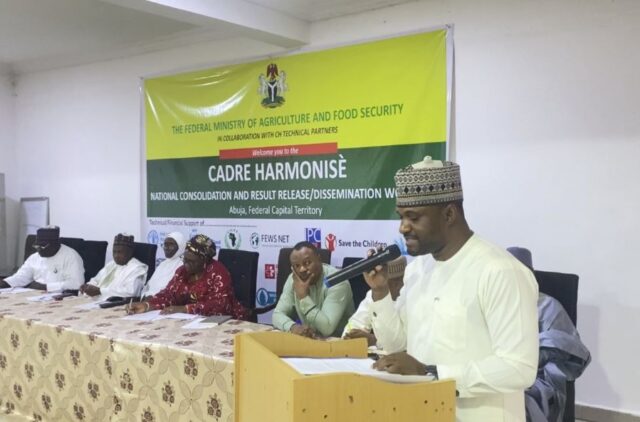…Floods in October 2023 in Adamawa impacted around 8,500 households, leading to mass displacements, particularly among women, children, and the elderly
MON, NOV 13 2023-theGBJournal|In 2024, Nigeria is expected to see about 26.5 million people grappling with high levels of food insecurity, as disclosed by the Government of Nigeria and its partners during the unveiling of the October 2023 Cadre Harmonisé analysis on food insecurity.
Moreover, approximately 9 million children are at risk of suffering from acute malnutrition or wasting. Of these, an alarming 2.6 million children could face Severe Acute Malnutrition (SAM) and require critical nutrition treatment.
The Cadre Harmonisé, an initiative focused on food and nutrition analysis, conducts studies biannually (in March and October) across 26 states and the Federal Capital Territory (FCT). With the Government’s leadership and the United Nations (UN) system’s support, the latest projection for 2024 indicates a sharp rise from the 18.6 million people currently vulnerable to food insecurity from October to December 2023.
Several factors are driving this trend, including ongoing conflicts, climate change impacts, escalating inflation, and rising costs of both food and essential non-food commodities (in part due to the devaluation of the naira and the discontinuation of the fuel subsidy). Persistent violence in the north-eastern states of Borno, Adamawa, and Yobe (BAY) hinders food availability and access.
Additionally, armed banditry and kidnappings in northwest and north-central states, including Katsina, Sokoto, Kaduna, Benue, and Niger, exacerbate the prevailing economic struggles.
Dr. Ernest Umakhihe, the Permanent Secretary of the Federal Ministry of Agriculture and Food Security, underscored the significance of the Cadre Harmonisé during a presentation in Abuja.
Represented by Mrs. Fausat Lawal, Director of Special Duties, Umekhihe highlighted that despite Government efforts, external challenges like the ongoing global economic effects of COVID-19 and the Russia-Ukraine war, which disrupts food systems, persist.
Of the 18.6 million people who experience food insecurity today, 3.3 million live in the northeastern states of the BAY region. This number might rise to 26.5 million nationwide by the height of the 2024 lean season ( and to 4.4 million in the BAY states) if immediate action is not taken.
Dominique Koffy Kouacou, the FAO Representative ad interim in Nigeria and to ECOWAS, while calling on the Government to expand CH coverage to the remaining 10 states said, FAO would continue to support the Government and the people of Nigeria to overcome food insecurity and malnutrition.
He stated, “In 2024, alongside our partners, FAO’s focus will be on agrifood systems transformation with deliberate attention on resilience-building, nutrition-sensitive agriculture, livestock, fisheries, and providing extension services.”
The Office for the Coordination of Humanitarian Affairs (OCHA) reported that floods in October 2023 in Adamawa impacted around 8,500 households, leading to mass displacements, particularly among women, children, and the elderly. Such extreme weather patterns, linked to the El Niño phenomenon, are further undermining food security “Food insecurity and malnutrition are among the main drivers of humanitarian need in the BAY states,” said Mr. Trond Jensen, the head of OCHA in Nigeria.
“People have been forced to adopt negative coping mechanisms such as survival sex and child labour to stay alive. Over the past year, dozens of farmers have lost their lives, and others have been abducted or injured while eking out a living outside the security perimeters of Borno’s garrison towns due to limited farming lands and few or no livelihood options.”
UNICEF’s Country Representative, Ms. Cristian Munduate, emphasized the urgent need for action. She said, “Every child deserves proper nutrition and a life free from hunger. It’s not merely a responsibility but a moral duty for governments and the global community to ensure these rights are upheld.”
Highlighting the long-standing issue, David Stevenson, WFP’s Country Representative, said, “The hunger crisis in Nigeria, fueled by the ongoing conflict in the northeast, needs urgent addressing.
Restoring peace in the northeast is critical for us to build pathways to production and achieve the northeast’s potential as the food basket of the country”.
Trend analysis for the northeastern states indicates consistently high or rising food insecurity levels since 2018. Over 4 million people have needed urgent assistance annually since June 2020.
The United Nations urges the Nigerian Government, donors, and stakeholders to commit resources and implement measures to avert a potential food and nutrition disaster, emphasizing the need for immediate support across the nation.
X-@theGBJournal|Facebook-the Government and Business Journal|email:gbj@govbusinessjournal.com| govandbusinessj@gmail.com










